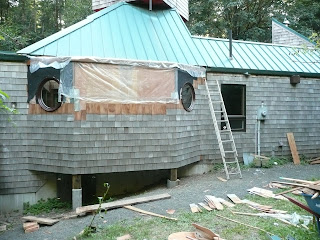
Since 1997, the Community Fund has distributed 6% of the profits from the Spirit Mountain Casino to nonprofit organizations in Western Oregon, fulfilling "their Native tradition of potlatch, a ceremony at which good fortune is distributed." We extend to them our sincere appreciation for their generosity to the community and their support for Soapstone's writing residency program for women.
Ancestors of the Confederated Tribes of Grand Ronde have occupied Western Oregon since time immemorial, developing distinct lifeways through generations of interaction with this bountiful and diverse landscape. You can trace this journey by visiting Ntsayka Ikanum: Our Story, a multimedia exploration of the history and culture of the Confederated Tribes of Grand Ronde.

The tribes that make up the Grand Ronde Confederation – Chasta, Rogue River, Umpqua, Molalla and Kalapuya – signed seven treaties ceding their vast lands to the federal government in the 1850s. Tribal members were force-marched 263 miles over 33 days in February and March of 1856 to Grand Ronde. The assault on the Tribes’ way of life continued until finally, in 1954, Congress passed the Western Oregon Indian Termination Act. The Grand Ronde Tribe was terminated. Tribal members were no longer acknowledged as Indians by the federal government and other tribes and had no rights to their reservation lands.
 A relocation program, scattering members across the country, followed termination. But in 1972 a small group of tribal members began the work to restore the tribe. Their base of operation was a small shack without running water and electricity located on the only land officially left of the once large Grand Ronde Reservation – the 2.5-acre tribal cemetery. Tribal members held bake sales, car washes and get-togethers to raise money to fund restoration efforts. They earned the support of members of Oregon’s congressional delegation and local community members. Finally, on Nov. 22, 1983, President Reagan signed the Grand Ronde Restoration Bill, making Grand Ronde a restored and federally recognized tribe, and the work of rebuilding a nation began. Just last fall, they celebrated their 25th anniversary as a restored tribe.
A relocation program, scattering members across the country, followed termination. But in 1972 a small group of tribal members began the work to restore the tribe. Their base of operation was a small shack without running water and electricity located on the only land officially left of the once large Grand Ronde Reservation – the 2.5-acre tribal cemetery. Tribal members held bake sales, car washes and get-togethers to raise money to fund restoration efforts. They earned the support of members of Oregon’s congressional delegation and local community members. Finally, on Nov. 22, 1983, President Reagan signed the Grand Ronde Restoration Bill, making Grand Ronde a restored and federally recognized tribe, and the work of rebuilding a nation began. Just last fall, they celebrated their 25th anniversary as a restored tribe.Soapstone urges you to learn about the history of all the Oregon tribes at this excellent website.
RUTH GUNDLE
